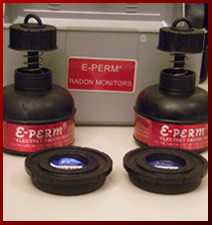What is the Process for Radon Testing?
 The first step to making sure your home is safe for your family is to have radon testing performed since radon can exist in any building, whether old or new. Radon-Rid, LLC explains the process for radon testing, which can include long and short term testing.
The first step to making sure your home is safe for your family is to have radon testing performed since radon can exist in any building, whether old or new. Radon-Rid, LLC explains the process for radon testing, which can include long and short term testing.
Types of Radon Testing
Two types of radon testing exist; both are relatively inexpensive and can save lives. Both short term tests and long term tests are available and reliable. Either test should be performed on the lowest level of the home that people regularly occupy.
Short Term Tests
In most cases, short term testing is performed first. These tests typically sample the air in an environment for 2 days, but they can also be administered for up to 90 days. If the short term test shows high radon levels, a second short term test can be performed right away to test the accuracy. If both tests have high readings, the homeowner can have a long term test performed, or schedule a professional to begin remediation.
One thing to consider is that some factors can skew the results of short term radon testing. For example, storms change air pressure levels. The type of pressure in the home, high or low, can change the readings of the test. Heavy rains can keep radon from escaping outside through the soil. Heavy winds can sweep radon into or out of the house. If possible, schedule your radon testing for a time when no severe weather is expected.
Some appliances can also affect the test readings, such as furnaces, bathroom fans, heaters and others. To get the most reliable results, the tests are often performed in “closed house” conditions. Closed house means just you might think. Doors and windows are closed, often for up to 12 hours before testing begins. Doors can be opened to enter or exit, but they are supposed to be closed as much as possible. If doors and windows are opened too often, radon levels could be diluted, and yield inaccurate test results.
Long term tests
Long term tests can run for 90 days up to a year. Long term testing is more reliable than short term testing, but often people just want to have the results back as soon as possible. In the case of the real estate transaction, time is often limited due to loan locks and closing dates. A buyer may be unwilling or unable to wait.
As a homeowner, whether you just want to test your home for radon to have peace of mind, or if you are thinking of putting your home on the market, as part of the process of radon testing, you can follow up a short term test with a long term one. A long term test is often more sophisticated and is able to counteract any fluctuations due to weather. Active radon testing devices can actually detect if any interference or tampering with the test conditions has occurred. This type of test helps if radon levels just happen to spike in the coldest month of the year due to having the house closed for warmth. If the test registers very low levels the rest of the year, you will likely have no need for mitigation.
Call Radon-Rid, LLC for Certified Radon Testing and Remediation
The EPA recommends having radon testing done every two years, because levels can change. Changes in soil density, construction, and other factors can cause radon levels to rise. If you test your home for radon every two years, you will have fair warning, and time to reduce levels, before you and your family have been exposed for too long. Contact us today to schedule radon testing in your home and gain peace of mind.
Related Posts
Why Are More People Testing for Radon in 2020?
Why Should I Hire a Professional Radon Testing and Remediation Company?
Is Radon Testing Necessary When Buying A Home?
We Want to Help
"(required)" indicates required fields
Categories
- Blog (48)
- Environmental Pollution (2)
- Family Health (9)
- In the News (10)
- Lung Cancer (5)
- Radon Remediation (10)
- Radon Testing (24)
Radon – The Silent Killer
Radon In Your Home
- Learn More About Radon Levels in Your County
- Take a few minutes to browse our Get To Know Radon Online Presentation.
- When you are finished, be sure to tell a loved one about our testing programs offered in Berks, Chester, Delaware, Lancaster, Montgomery & Philadelphia Counties.